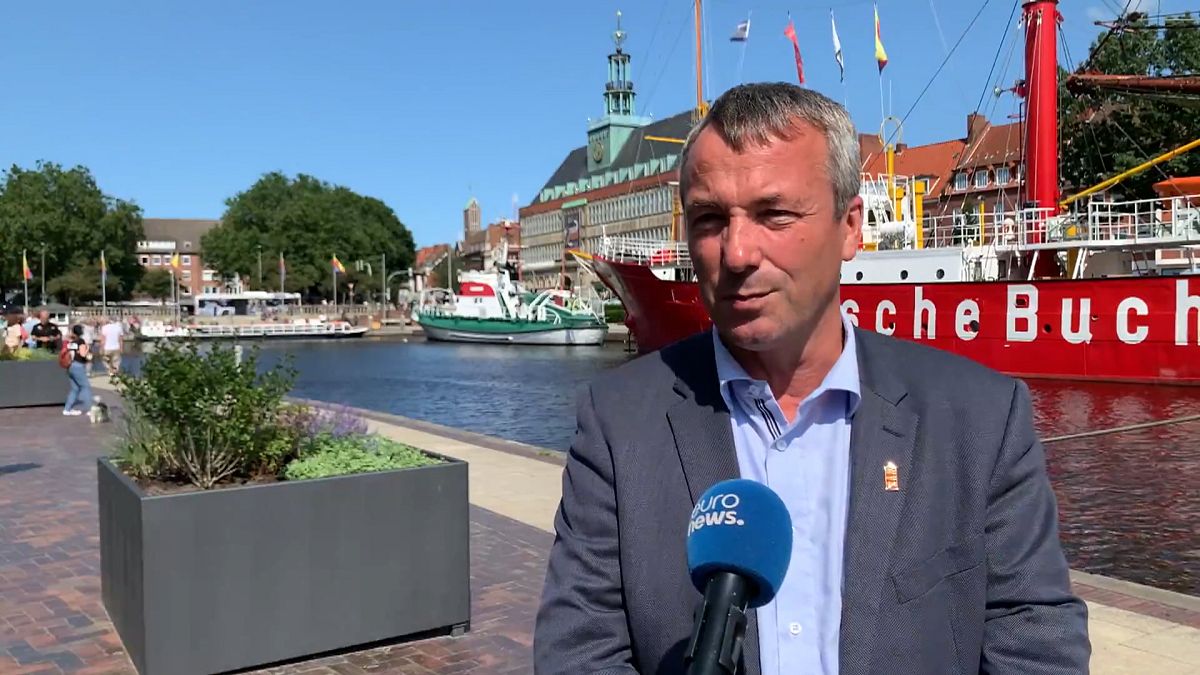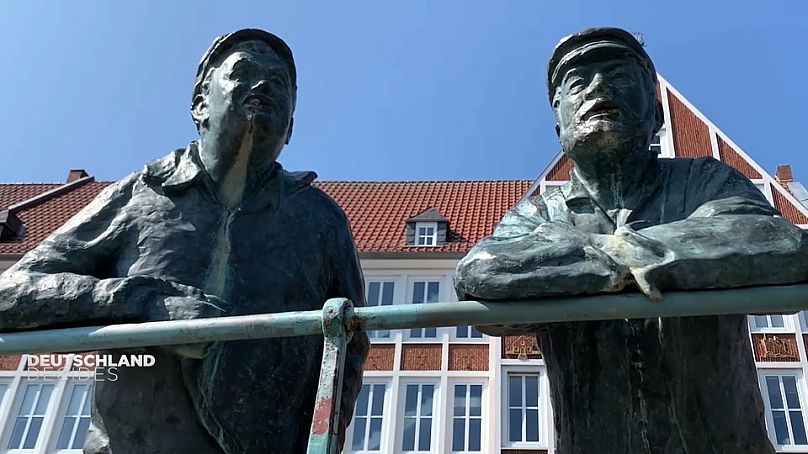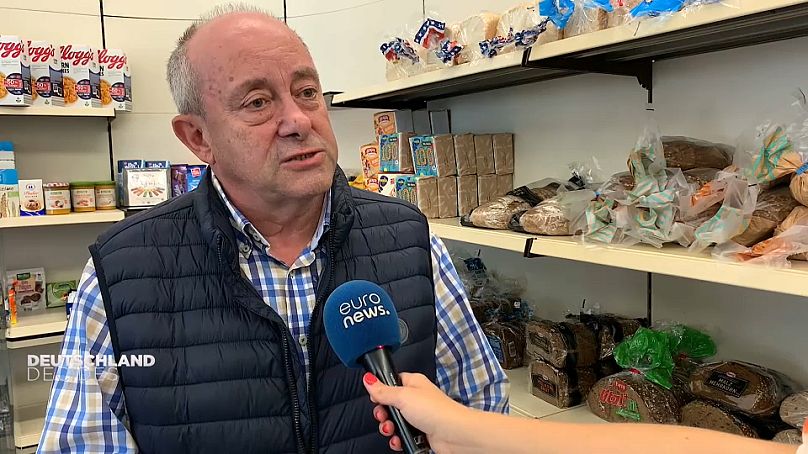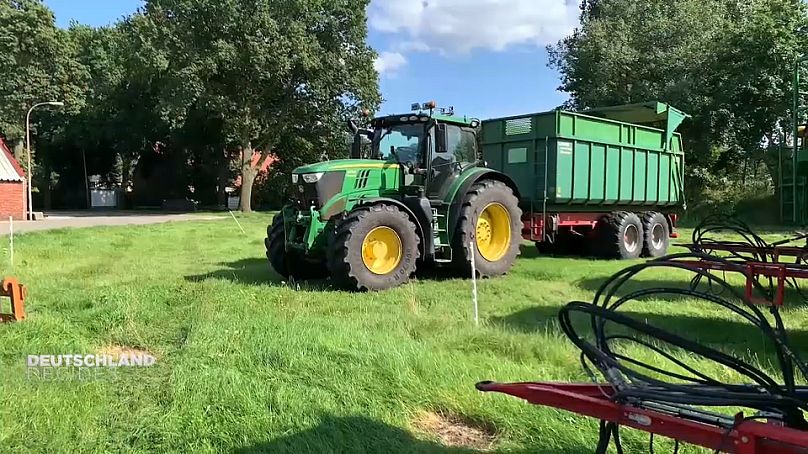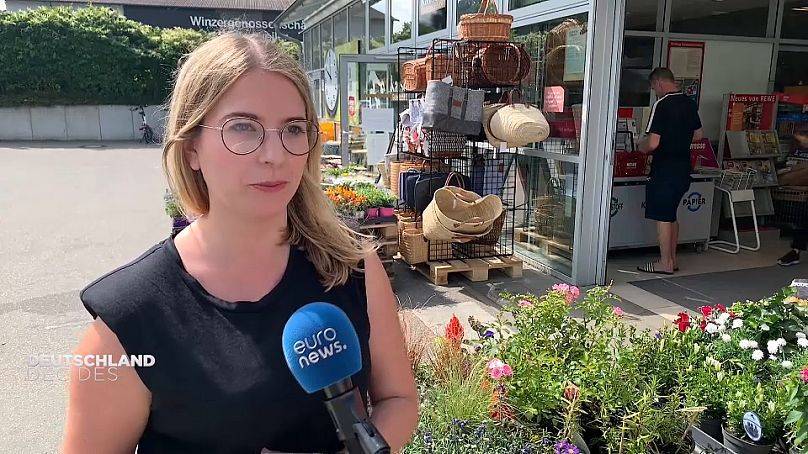We take a look at the regions that historically back Germany's main political parties ahead of the 2021 federal elections.
It’s a sunny Monday in late August in the constituency of Emden-Vechta. Tucked away on Germany’s north coast, the fishing boats bob serenely as tourists take an early morning walk – the fresh fish on offer by lunchtime and the area’s Dutch flair seem to be a catch for day-trippers.
In Emden harbor, three statues of the three "Delftspucker" – emulating three out-of-work fishermen spitting tobacco into the waters of the Delft – are a reminder of the region’s long industrial and seafaring history.
At the end of the 16th century, Emden became the most important transshipment port on the North Sea and, 500 years later, continues to play an integral role as one of Europe’s three main ports for car shipping – more specifically German vehicles.
Just minutes from the bustling shipyard lies a Volkswagen plant. The car manufacturer provides some 10,000 jobs for the region. In the not-so-distant future, the Passat models currently leaving the production line will be replaced with electric vehicles.
The combination of largely unbroken industry has, over decades, resulted in strong support for the Social Democrats (SPD). Traditionally the party for blue-collar workers, the SPD, like many social democratic parties around Europe, has largely lost its relevance – and in due course voters. But that’s less the case here in Aurich-Emden where more than 191,000 people are eligible to vote.
For many locals, voting SPD is a question of tradition.
"The popularity probably grew through the huge number of workers here in the 50s, 60s and 70s, " says one local. "People's parents and grandparents voted for them and that's just been passed on down generations."
In the 2017 election, one in two voters here gave their first vote, which goes to a direct candidate, to the SPD’s Johann Saathoff. Almost 38% gave their second vote, which goes to a party, to the SPD.
For Saathoff, much of the SPD’s success lies in the communication with voters.
"Even though I work in Berlin and Emden, I’m always reachable," he says. I think half of the constituency has my phone number. For me, the work doesn’t start just three weeks before an election. It begins the morning after an election."
On leaving the area, it’s impossible to miss the enormous wind turbines dotted through the East Friesian countryside. Manufacturing them has also become an important factor for the local economy.
As the turbines disappear in the rearview mirror, we head further south, in the same state of Lower Saxony, to reach Cloppenburg-Vechta. More than 220,000 people here are eligible to vote. And in 2017, almost 60% of them gave their first vote to the Christian Democrat’s (CDU) candidate Silvia Breher. Just more than 53% gave the conservative CDU their second or party vote.
Deep in the German countryside, the CDU is as deeply rooted in Cloppenburg-Vechta as Catholicism. The area has the lowest number of people leaving the Catholic Church in the whole of Germany.
At a foodbank, one volunteer says the Church and the CDU go hand in hand. "On the whole, the CDU is everything that there needs to be here: namely, Christian and social. And that's very important."
Driving between tiny towns, roadside Jesus statues stretch out a hand to passers-by. But it was pigs and less probably divine intervention that brought prosperity to the area.
Imports of animal feed and cultivation of the soil have resulted in huge economic growth in the area since the 1960s. The results are on display in bricks and mortar, in the shape of huge homes belonging to the regions’ farmers and cultivators. In the post-war years, economic success grew almost simultaneously alongside that of the CDU.
Today though, farmers like Silke and Sven Diekhaus are concerned about what the future might hold for their industry.
"Due to the change in people’s way of thinking, I'd say it's becoming really quite difficult for agriculture," says Silke, pointing to the push for more sustainable and organic farming.
Her partner Sven says the CDU is the best choice to protect the region’s agriculture. "I think Green agricultural policy is very ideological," he says. "They won't manage to feed us in the long run."
In this remote area where residents are reliant on their cars, climate protection policy also resonates differently with many voters.
Silvia Breher, the CDU’s direct candidate in Cloppenburg-Vechta, says "other ideas" are needed when it comes to reducing carbon emissions in the area.
"When people in Berlin talk about local public transport and the ban on internal combustion engines by 2030, people here say yes, yes, we have to tackle the issue, but life here really depends on cars," says Breher.
However, deep in Germany’s southwest, climate protection has long been a priority for voters in Freiburg im Breisgau. After a long trip south, close to the French border, we end our whirlwind tour of the chancellor candidate party strongholds in the Green Party stronghold.
In the 2017 federal elections, the Greens’ direct candidate scooped up 25.7% of votes, and the party itself 21.2%. By comparison, the Greens walked away with just 8.7% of votes nationwide.
On the Green party campaign trail, Chantal Kopf direct candidate in Freiburg im Breisgau says the support for the Greens can be traced back to a nearby protest in 1974 when demonstrators in Wyhl, close to the city of Freiburg, set out on a crusade against a planned nuclear energy plant in the Kaiserstuhl area.
"This tradition lives on," says Kopf. "Especially among young people in the Fridays for Future movement, which is particularly well represented here in the region and in Freiburg."
Nestled alongside nature in the Black Forest, the picturesque university town of Freiburg became the first city to elect a Green party mayor almost 20 years ago.
In its pursuit to become more environmentally friendly, the area boasts bike priority routes and sustainable urban housing projects like Vauban, where all of the houses were built according to low-energy consumption standards.
Two decades since it first opened, almost 6,000 people call the ecological district home – and some 70% of them do without a private car.
"The Greens think about the people – about the less well-off people too," say one Vauban resident. They don't have their nose in the air so to speak. And they think of the little ones and the children – for the future and for nature."
For all the leading party strongholds, party allegiance has become largely embedded in a region’s identity. But guaranteed success in their respective strongholds is by no means a given for any party. Never before have voters faced an election during a period of such rapid change. It will be a fight for every vote.
